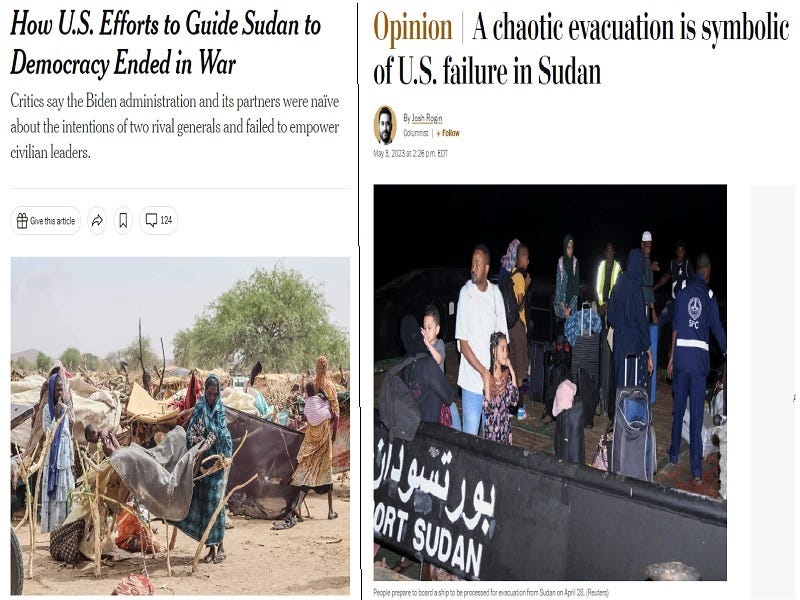These limited hangouts are meant to justify more American meddling in Sudan on the pretexts of making amends for the prior policy that the New York Times and the Washington Post both argued was responsible for this crisis in parallel with preventing the “protracted” conflict that the US’ Director of National Intelligence just predicted will likely break out if peace isn’t restored as soon as possible.
The Mainstream Media’s (MSM) surprise admissions on Wednesday that American meddling ruined Sudan aren’t what they seem on the surface. Casual observers might be tempted to initially interpret the New York Times’ (NYT) piece about “How U.S. Efforts to Guide Sudan to Democracy Ended in War” and the Washington Post’s (WaPo) complementary one about how “A chaotic evacuation is symbolic of U.S. failure in Sudan” as warnings against any further intervention there based on their titles.
Upon reading them, however, it’s discovered that these suspiciously timed articles are actually arguing that America simply took the wrong approach to so-called ‘democracy-building’ by disproportionately relying on the two generals who are now warring with one another. Instead, their authors suggest, it should have relied more on civil society and also imposed crippling punitive sanctions against Generals Burhan and Hemedti after the last coup in late 2021.
Far from lobbying against more meddling in Sudan and trying to learn the lessons from the US’ last failed attempt over the past few years, these two leading MSM outlets are facilitating the US’ ‘mission creep’ there that a senior Pentagon official strongly implied is already in progress over two weeks back. On the same day as these articles were published, an unnamed senior Sudanese diplomat told Sudan Tribune that the US plans to establish a joint mechanism for talks between the warring parties.
The Sudanese Ambassador to France also ended up telling Arab News on Wednesday that his government will support any American initiative to end the fighting just like it’ll support any African or Saudi one. One day later, Director of National Intelligence Avril Haines told the Senate Armed Services Committee in a testimony that the conflict is “likely to be protracted” since neither side has an incentive to stop and both are supposedly seeking “external sources of support” during the shaky ceasefire.
Right around the same time that she was speaking about Sudan, Biden authorized sanctions against “individuals responsible for threatening the peace, security, and stability of Sudan; undermining Sudan’s democratic transition; using violence against civilians; or committing serious human rights abuses.” Neither party was explicitly named, but this move can be interpreted as pressuring both of them to comply with whatever demands that the US soon puts forth via its latest meddling campaign.
Recalling the suspiciously timed admissions from two of the US’ leading MSM outlets the day prior hinting that their country has a moral responsibility for what just happened, it compellingly appears in hindsight that these were aimed at generating support for its reportedly planned mechanism. The pretext for convincing the public to back this is that it could prevent a “protracted” conflict, with the subtext being that it’ll also make amends for the US’ previously wrong approach to ‘democracy-building’.
Just like the NYT unexpectedly vindicated Iran’s execution of a top UK spy on Monday as part of a limited hangout for advancing the larger goal of fearmongering about Russia after reporting that Moscow confirmed that traitor’s identity to Tehran, so too do these admissions advance other ulterior ends too. In particular, they aim to justify the US’ efforts to squeeze other players out of the peace process via its reportedly planned mechanism, thus neutralizing the principle of “African solutions to African problems”.
That axiom explains the African Union’s multipolar approach to crises on the continent, but it’s now being directly challenged by America’s latest meddling, which is pushed on faux humanitarian-moral pretexts connected to preventing a “protracted” conflict and making amends for its previous policy. An artificial sense of urgency is achieved by scaring their targeted audience into thinking that Russia will exploit the US’ reluctance to once again meddle in Sudan, hence why it allegedly has to act right away.
WaPo’s spin on everything hammered home these points when its perception manager lamented that “As the infighting intensified, the United States ceded international diplomatic leadership to other countries and failed to properly support civil society groups opposed to military rule.” He also urged near the end that “the United States should not simply stand aside and watch Africa’s third-largest country further descend into crisis” despite its policy “failure” being responsible for this crisis in the first place.
Taken together, there should be no doubt that the MSM’s admissions that American meddling ruined Sudan are misleading since they’re actually meant to justify more meddling on the pretext of making amends for that prior policy in parallel with preventing a “protracted” conflict. A top Russian UN diplomat was right in assessing last week that foreign “political engineering” was responsible for this crisis, which the MSM just admitted was indeed the case, albeit in pursuit of the US’ ulterior interests.




